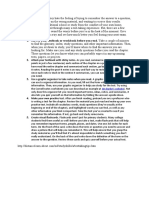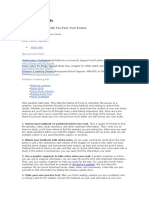0% found this document useful (0 votes)
11 views1 pageA General Study Guide
The document outlines effective study techniques for students to enhance learning and retention, including active recall, spaced repetition, the Pomodoro technique, the Feynman technique, and structured note-taking. These methods aim to improve academic performance by promoting efficient information retention. By applying these strategies, students can engage better with their study material and prepare more effectively for exams.
Uploaded by
jajajaja123454321luckCopyright
© © All Rights Reserved
We take content rights seriously. If you suspect this is your content, claim it here.
Available Formats
Download as DOCX, PDF, TXT or read online on Scribd
0% found this document useful (0 votes)
11 views1 pageA General Study Guide
The document outlines effective study techniques for students to enhance learning and retention, including active recall, spaced repetition, the Pomodoro technique, the Feynman technique, and structured note-taking. These methods aim to improve academic performance by promoting efficient information retention. By applying these strategies, students can engage better with their study material and prepare more effectively for exams.
Uploaded by
jajajaja123454321luckCopyright
© © All Rights Reserved
We take content rights seriously. If you suspect this is your content, claim it here.
Available Formats
Download as DOCX, PDF, TXT or read online on Scribd
/ 1























































